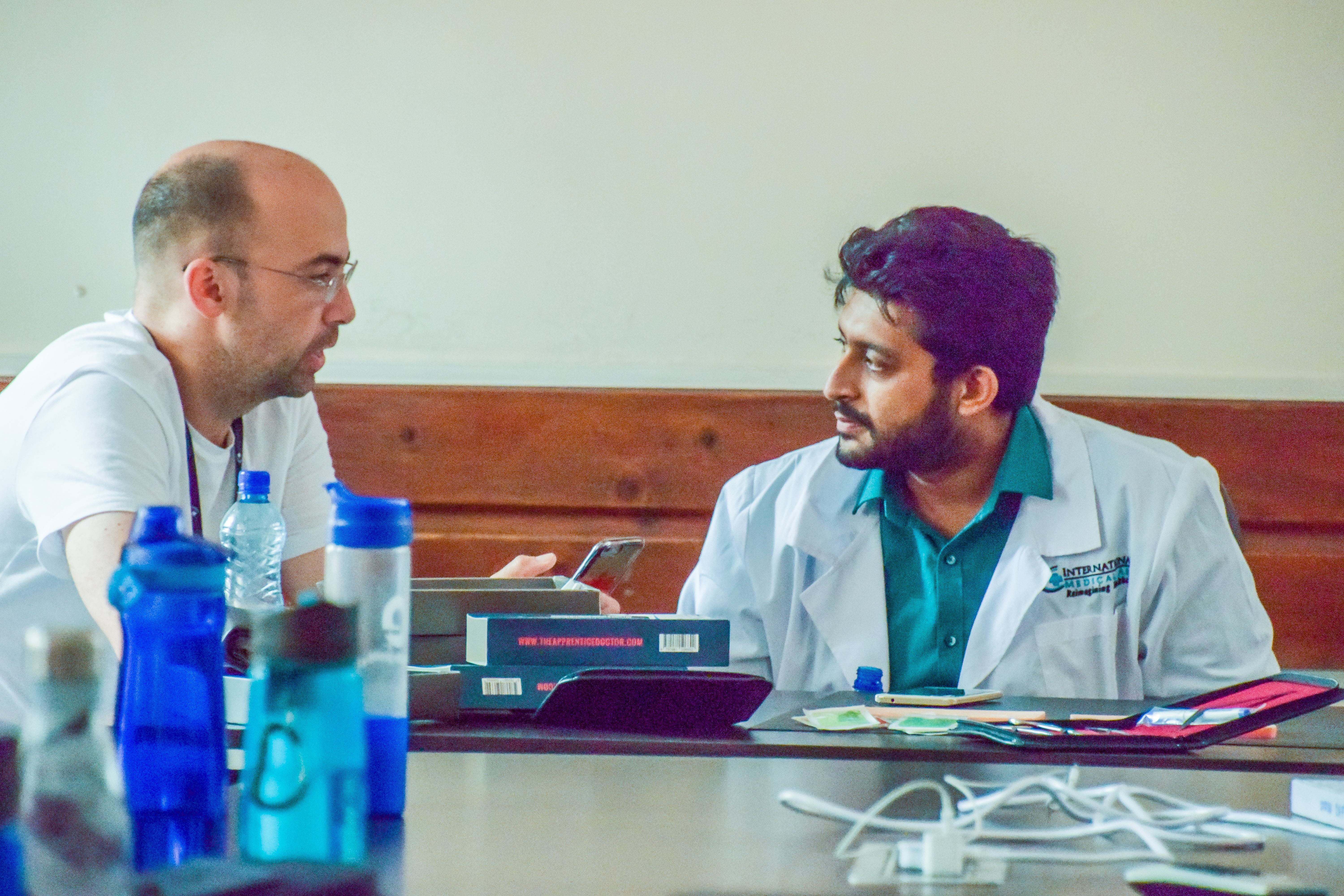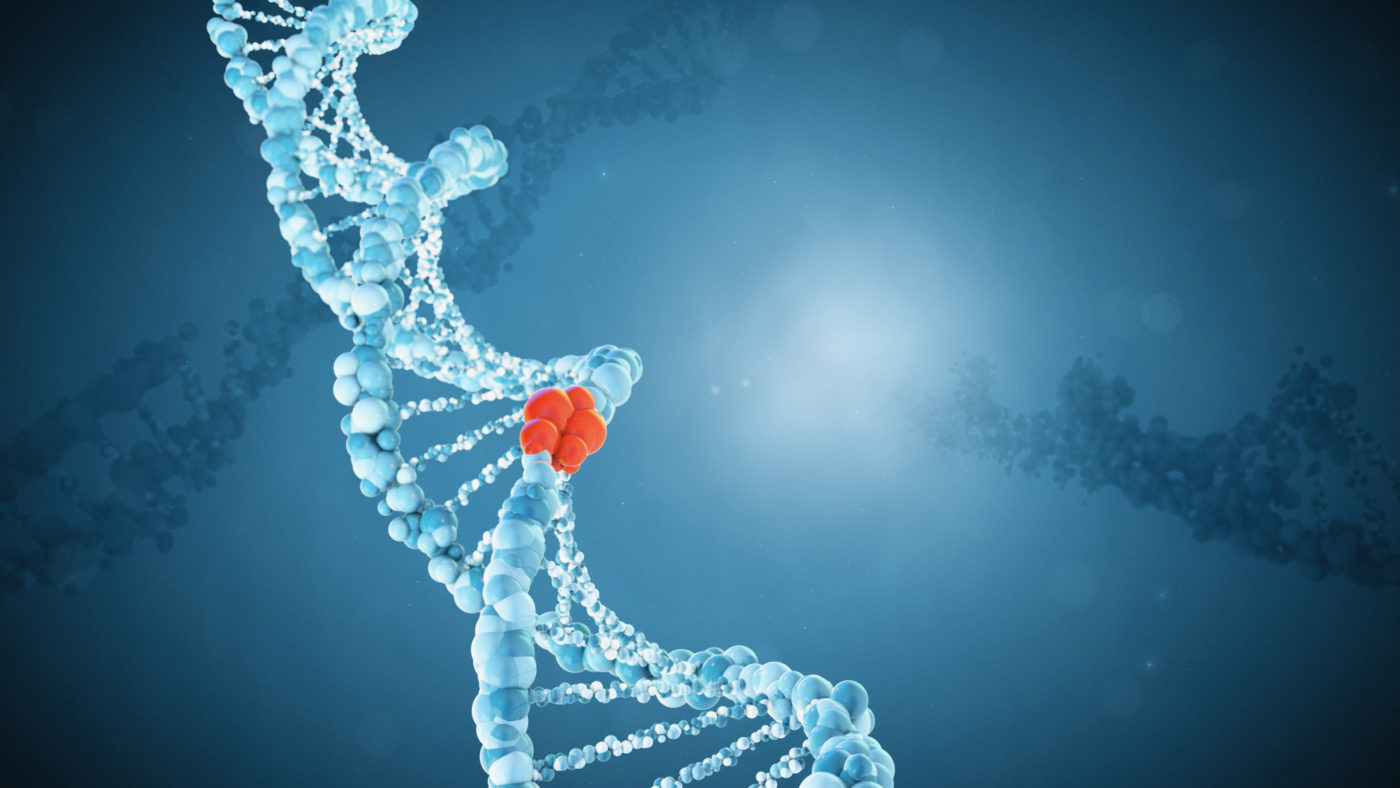The Medical College Admission Test (MCAT) is a standardized exam for prospective medical students in the United States, Australia, Canada, and Caribbean Islands. Medical schools review MCAT scores to determine whether or not an applicant has the foundational knowledge necessary to succeed in medical school.
The MCAT tests your scientific knowledge, as well as your ability to apply this knowledge. In fact, the modern MCAT requires examinees to employ high levels of scientific reasoning and critical thinking skills to successfully answer the majority of questions.
Understanding the scope of the MCAT, as well as the skills required to excel on the exam, is essential for all prospective medical students to optimize their studies.
In this MCAT breakdown, we’ll discuss everything you need to know about each MCAT section. We’ve also compiled a list of MCAT FAQs at the end of this article, so you can get all your questions answered in one place.
There’s a lot to cover about what is on the MCAT, so consider bookmarking this page for easy reference.
MCAT Breakdown by Admissions Experts
Whether you’re learning about The AAMC Core Competencies for Entering Medical Students or How to Register for the MCAT in 2022 — at International Medical Aid, we’ve got our fingers on the pulse of everything related to medical school admissions.
That’s because we specialize in Medical School Admissions Consulting.
Our team has helped countless students get into their dream schools by providing personalized, one-on-one support throughout the entire admissions process.
And today, we’re sharing everything you need to know about MCAT sections and what’s on the MCAT. Let’s get into it!
What Is on the MCAT?
The MCAT is composed of four sections, in this order:
- Chemical and Physical Foundations of Biological Systems (Chem/Phys)
- Critical Analysis and Reasoning Skills (CARS)
- Biological and Biochemical Foundations of Living Systems (Bio/BioChem)
- Psychological, Social, and Biological Foundations of Behavior (Psych/Soc)
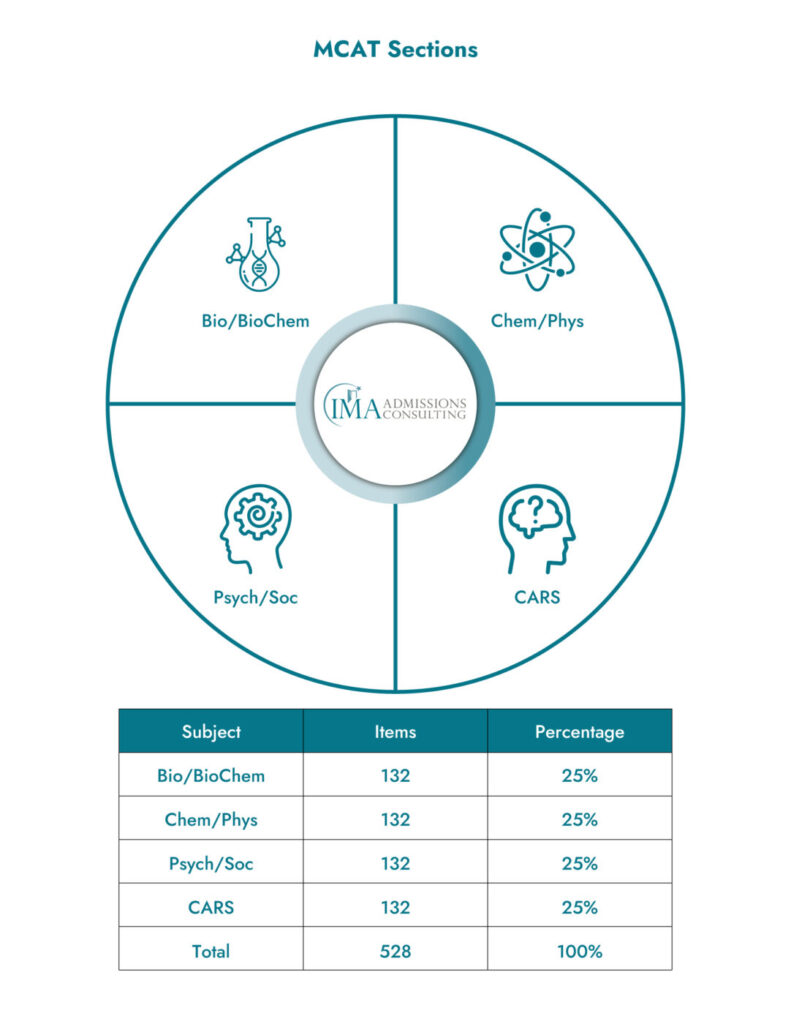
In addition to testing your knowledge in these subjects, the MCAT is designed to test certain scientific concepts and problem-solving skills necessary to succeed in medical school.
Scientific Concepts and Principles involves recognizing and analyzing relationships between concepts, as well as demonstrating an understanding of important scientific concepts and principles.
Scientific Reasoning/Problem-Solving involves reasoning about theories, models, and principles. You’ll also need to analyze and evaluate scientific extrapolations and predictions.
Data-Based and Statistical Reasoning involves interpreting data and patterns from figures, graphs, and tables. You’ll also need to be able to reason about data and infer conclusions.
Reasoning About Research Design and Execution involves reasoning about ethical issues in research and understanding how scientific research is conducted.
The Association of American Medical Colleges (AAMC) has also identified 10 foundational concepts you need to know to pass the MCAT. We’ll be covering these in detail for each MCAT section they apply to.
How Long Is the MCAT?
For most people, the MCAT will be the longest exam they’ve ever taken.
Each MCAT section is 90-95 minutes long. In total, there are 6 hours and 15 minutes of testing in the MCAT.
There is an optional 30-minute break in the middle of the exam. There are optional 10-minute breaks after the first and third sections.
There’s also a tutorial, examination agreement, and satisfaction survey.
With breaks and everything else, the MCAT is 7 hours and 30 minutes.
Has the MCAT Changed?
The MCAT was first introduced in 1928. Since then, it’s undergone a few revisions. The most recent change was in April of 2015.
What did the MCAT change? Well, broadly speaking, the MCAT has a new focus on evaluating how well you use your foundational knowledge to solve complex problems.
Yes, there’s a lot on the MCAT you can study for like any other exam. However, as physicians are increasingly expected to apply new concepts and technologies in their practice, it’s more important than ever for our doctors to understand how to learn and apply new information.
Increasingly, medical schools across the country are innovating their curriculum and teaching practices to better train lifelong learners in critical thinking skills and sociological principles.
So, the new MCAT better reflects the current state of society and modern healthcare challenges. And, if you look at our Ultimate Medical School Guides, you’ll see the skills tested by the MCAT are very similar to the admissions requirements and selection factors for most medical schools. Studying for the exam prepares you for medical school and beyond.
Now that we know a little more about the MCAT, let’s dive into the details of each section.
MCAT Section One: Chemical and Physical Foundations of Biological Systems (Chem/Phys)
- 95 minutes
- 59 questions
The first section on the MCAT is Chemical and Physical Foundations of Biological Systems (Chem/Phys). In this section, you solve problems using your scientific reasoning skills in combination with your knowledge of chemical and physical concepts in biology.
The Chem/Phys MCAT section evaluates your knowledge and understanding of:
- Physical, mechanical, and biochemical functions of organs, organ systems, and human tissues
- Basic physical and chemical principles in human biology
- Ability to apply your knowledge of chemical and physical principles to living systems
Basic research methods and statistics concepts and how to apply them to problems in the natural sciences
Disciplines You Need to Know for MCAT Section One (Chem/Phys)
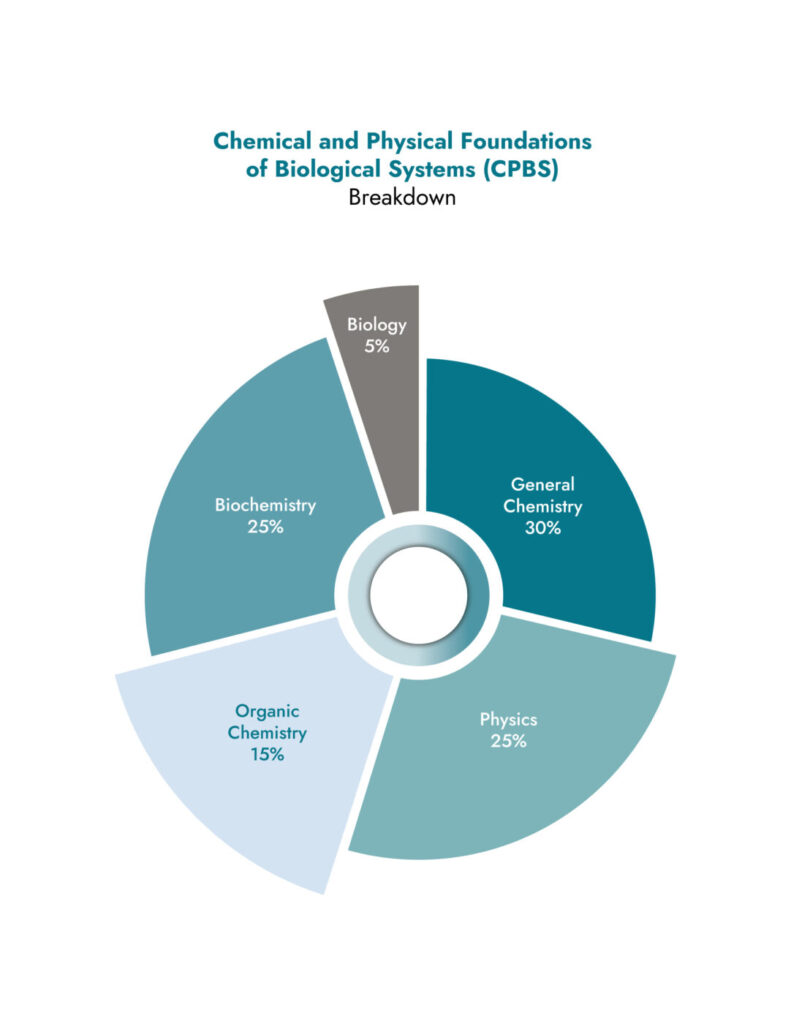
The AAMC provides an MCAT breakdown by discipline, skills, and foundational concepts. Let’s start with an overview of the disciplines you need to know for MCAT section one. Here’s what you can expect to see in section one, give or take 5%.
First-semester biochemistry, 25%
Introductory biology, 5%
General chemistry, 30%
Organic chemistry, 15%
Introductory physics, 25%
Foundational Concepts in MCAT Section One (Chem/Phys)
Two foundational concepts prevail throughout MCAT section one.
The first: The behavior of complex organisms, such as sensing, processing, and responding to signals and the environment, can be understood in terms of physical principles.
The processes that happen inside of organisms follow the laws of physics. This means that they can be explained with equations that model how they work at a very basic level. For example, the way electromagnetic radiation works can be used to understand things like how molecules are structured or how the human body looks. In the same way, atomic structure can be used to predict how atoms will behave, including how much energy is needed to make them change.
Specifically, you’ll need to understand the following:
- Translational motion, work, forces, energy, and equilibrium in living systems
- Electrical circuits, electrochemistry, and their elements
- Atoms, nuclear decay, electronic structure, and atomic chemical behavior
- How fluids work in the circulation of blood and gas movement/exchange
- How sound and light interact with matter
The second foundational concept in MCAT section one: Chemical interactions and reactions are governed by certain principles. These principles help us understand the molecular dynamics of living systems.
The chemical processes that take place in living things can be understood by looking at how solutions behave, thermodynamics, and how molecules are structured and interact with each other.
You’ll need to be familiar with the following:
- Water and its solutions
- Separation and purification methods
- Molecules and intermolecular interactions
- Foundational principles of chemical thermodynamics and kinetics
- Structure, function, and reactivity of biologically-relevant molecules
Skills Tested in MCAT Section One (Chem/Phys)
The Chem/Phys MCAT section mainly tests your scientific reasoning and knowledge of scientific principles, with some questions about research and data. Here’s the breakdown:
Data-Based and Statistical Reasoning – 10%
Reasoning About Research Design and Execution- 10%
Scientific Concepts and Principles – 35%
Scientific Reasoning/Problem-Solving – 45%
MCAT Section Two: Critical Analysis and Reasoning Skills (CARS)
- 90 minutes
- 53 questions
After Chem/Phys, the next MCAT section is Critical Analysis and Reasoning Skills (CARS). Of all the MCAT sections, CARS is the most difficult for many examinees. Statistically, examinees receive the lowest average scores on CARS, according to the AAMC.
Since it’s the hardest and most unique section of the MCAT, we’ll discuss CARS at length.
The CARS section includes questions that test your ability to understand what you read. This section measures the reasoning and analysis skills necessary to succeed in medical school.
The CARS section of the MCAT asks you to analyze passages from a variety of subjects in the social sciences and humanities. After reading each passage, you will answer a series of questions testing your comprehension of the material. You’ll also be tested on your ability to reason through and analyze the material to arrive at conclusions.
The passages will usually be no more than 600 words. They will contain everything you need to answer the follow-up questions.
Though the passages in the CARS section are short, they are also intricate. Many passages are multidimensional and address the relationships between theories. They may contain provocative, complex ideas. The writing styles of each question also often prove challenging. Many passages use sophisticated vocabulary and unique logic.
The CARS section tests your:
- comprehension, analysis, and reasoning skills
- ability to navigate a wide range of ethical and philosophical texts from the social sciences and humanities
Disciplines You Need to Know for MCAT Section Two (CARS)
The AAMC breaks down the MCAT sections into categories of disciplines, skills, and fundamental concepts. Here’s an overview of the disciplines you’ll encounter in MCAT section two (give or take 5%).
Humanities, 50%
Social Sciences, 50%
Humanities passages will be related to things such as art, ethics, literature, philosophy, and culture.
Passages from the social sciences may include topics such as anthropology, economics, history, population health, political science, education, sociology, and psychology.
Skills Tested in MCAT Section Two (CARS)
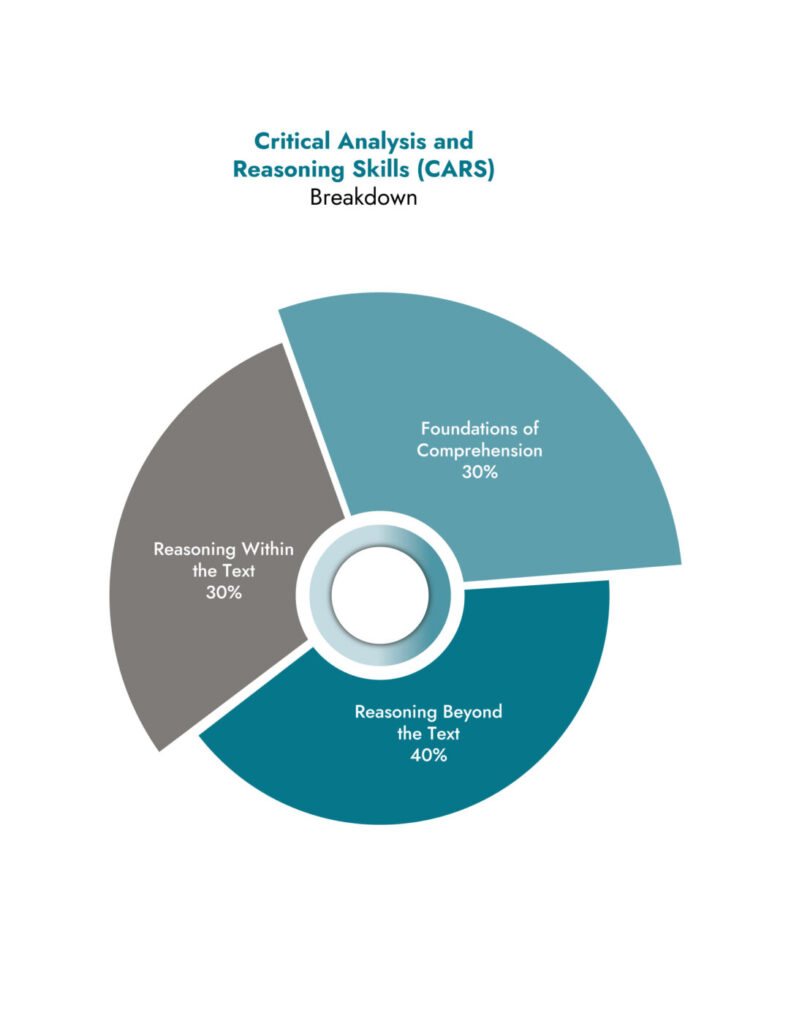
The Critical Analysis and Reasoning Skills section of the MCAT exam will test three important skills — foundational comprehension, reasoning within the text, and reasoning beyond the text.
Foundational Comprehension involves understanding the basic parts of the text and its overall meaning. For instance, you may be asked to identify the main point of a passage or provide an overview of the entire text.
Foundational comprehension also includes being able to infer meanings and intentions from textual context. You may be required to determine the meaning of a word or phrase based on the surrounding context. Your ability to infer meaning from the structure of the text will also be tested, as well as your ability to identify the intention of a passage through its tone.
Reasoning within the text involves recognizing and evaluating arguments. This may include evaluating the soundness, plausibility, or logic of a specific claim made in the passage and how it relates to the evidence used or the conclusion. You may be asked to scrutinize an author’s objectivity or faulty foundational logic.
Reasoning within the text also involves inferring an author’s bias or assumptions based on inconsistencies within the text. This can also include detecting paradoxes or hasty conclusions. Additionally, you may be asked to infer who the author is addressing or what position they are arguing against.
Reasoning outside the text involves applying information to new situations. This usually involves reasoning out how the ideas presented in a passage could be applied to other fields or used to solve or complicate problems not mentioned in the text.
Reasoning outside the text also involves the reverse — integrating new information into the passage and determining its effect on the argument or idea. You may be asked how certain conditions change the outcome of an argument, or you may need to identify what a passage needs to alter to accommodate certain facts.
Mid-Exam Break
If this were the MCAT, you’d get a break at this point. So, we thought we’d tell you about how to get a break from the challenges of applying to medical school.
Our Medical School Admissions Consulting services can take the pressure off and help you put your best foot forward so you can increase your chances of getting into the school of your dreams.
Our experts have a wealth of experience and will work with you one-on-one to create a personalized strategy for success.
We’ll also provide you with resources, advice, and support every step of the way — from navigating school-specific admissions requirements to conducting mock admissions interviews.
If you’re ready to get started on your medical school journey, schedule a free consultation so we can get to know how best to serve you.
Now, let’s dive into the second half of the MCAT exam.
Disciplines You Need to Know for MCAT Section Three (Bio/BioChem)
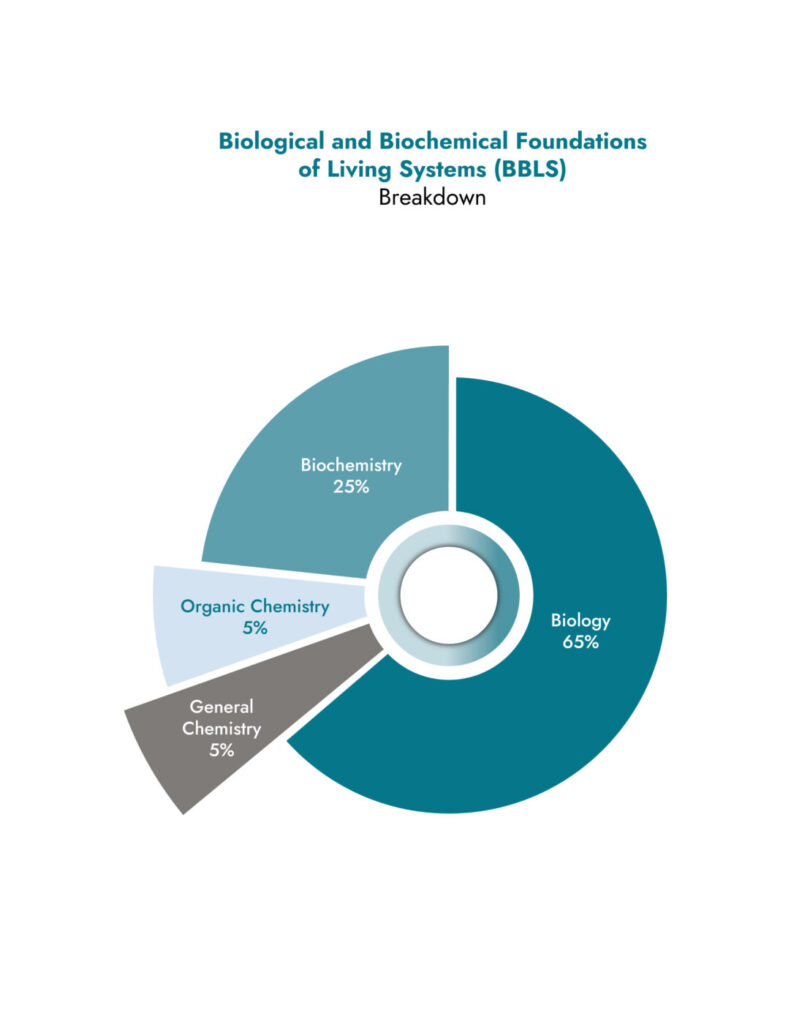
The AAMC breaks down the MCAT sections into categories of disciplines, skills, and fundamental concepts. Here’s an overview of the disciplines you’ll encounter in MCAT section three (give or take 5%).
Introductory biology, 65%
First-semester biochemistry, 25%
Organic chemistry, 5%
General chemistry, 5%
Foundational Concepts in MCAT Section Three (Bio/BioChem)
To ace section three of the MCAT exam, you’ll need to understand three foundational concepts.
First, the unique properties of biomolecules determine the way cells are structured and function and how they contribute to life-maintaining processes.
The way biomolecules are structured and how they interact with each other determines what they do in cells. Biomolecules work together to respond to the environment to sustain living systems. Biomolecules are fashioned or degraded depending on perceptions of the organism’s needs.
Concepts specifically covered in the Bio/BioChem MCAT section include:
- Fuel molecule metabolism and bioenergetics principles
- Processes that expand genetic diversity
- Transmission of heritable information
- Function and structure of proteins and amino acids
- Transmission of genetic information from gene to protein
Second, Cells, molecules, and organs work together in an organized way to carry out the functions of living things.
Cells are the basic units of life. Cells divide to grow and maintain organisms and continue a species through asexual or sexual reproduction. A cell’s environment affects how genes are expressed and impacts the cell’s macromolecules and how its subcellular organelles are arranged.
Specifically, you’ll need to understand:
- Assemblies of molecules, cells, and groups of cells within organisms
- Cell division, differentiation, and specialization
- Prokaryotes and viruses: their physiology and genetics, structure and growth
Finally, tissue and organ systems sense internal and external environments. They work together to keep the internal environment stable while responding to an external environment.
Complex living things are able to maintain a stable internal environment while adapting to changes in the outside world. This is made possible by the interactions of many different organ systems, which work together to regulate the organism’s health and balance. No matter what is happening around them or how they are changing, these mechanisms help keep the organism alive and thriving through complex mechanisms of regulation.
Specific topics in this foundational concept include:
- Structure of the main organ systems and their integrative functions
- The nervous and endocrine systems: how they coordinate the organ systems and their overall functions and structure
Skills Tested in MCAT Section Three (Bio/BioChem)
The Bio/BioChem MCAT section mainly tests your scientific reasoning and knowledge of scientific principles, with some questions about research and data. Here’s the breakdown:
Data-Based and Statistical Reasoning – 10%
Reasoning About Research Design and Execution- 10%
Scientific Concepts and Principles – 35%
Scientific Reasoning/Problem-Solving – 45%
MCAT Section Four: Psychological, Social, and Biological Foundations of Behavior (Psych/Soc)
- 95 minutes
- 59 questions
After Bio/BioChem, examinees move on to the final MCAT section — Psychological, Social, and Biological Foundations of Behavior, aka, Psych/Soc.
The Psych/Soc MCAT section evaluates your knowledge of how psychological, social, and biological factors affect how people react to and perceive the world. It covers human behavior, how people think and feel, socio-cultural factors that affect well-being, and the relations between social systems and access to healthcare.
This section covers how behavior affects people’s health. It addresses many subjects that doctors need to understand to handle human and social issues in healthcare.
In addition to psychological, social, biological, and behavioral knowledge, this section requires you to use scientific reasoning and critical thinking to solve problems.
The Psych/Soc section tests:
- foundational knowledge of psychological, sociological, and biological concepts
- biological concepts related to behavior and mental processe
- basic methods and statistics practices used in research
- scientific reasoning
Disciplines You Need to Know for MCAT Section Four (Psych/Soc)
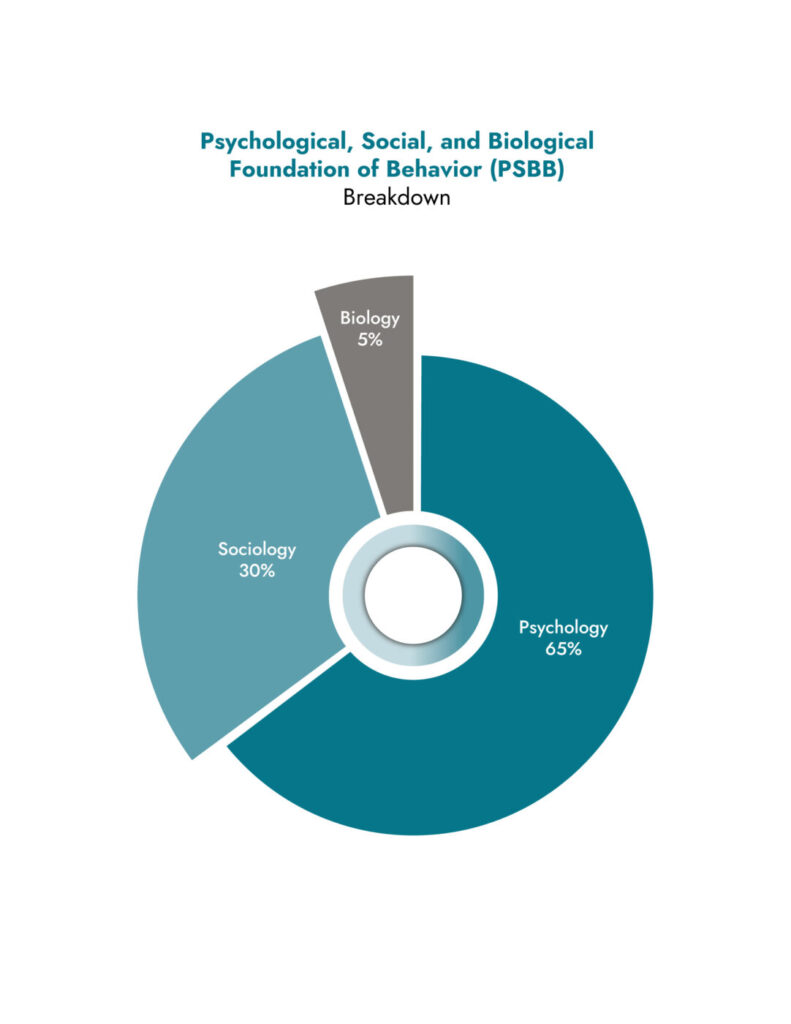
The AAMC provides an MCAT breakdown that includes the disciplines, skills, and fundamental concepts required to succeed in each section. Here’s an overview of the disciplines you’ll encounter in MCAT section three (give or take 5%).
Introductory psychology, 65%
Introductory sociology, 30%
Introductory biology, 5%
Foundational Concepts in MCAT Section Four (Psych/Soc)
There are five important foundational concepts present throughout the Psych/Soc section. This section tests your ability to apply your understanding of these foundational concepts to solve problems.
First, biological, psychological, and sociocultural factors all have a role in how people perceive the world, think about it, and respond to it.
Our experiences are affected by how we sense, perceive, think about, and react to stimuli. Components of this process include detecting and perceiving stimuli through cognition, emotion, and stress.
Along these lines, the Psych/Soc section covers:
- Sensing the environment
- Making sense of the environment
- Responding to the world
Second, behavior and behavior change are influenced by biological, psychological, and sociocultural factors.
People are complex and human behavior is rarely as simple as cause and effect. Many overlapping dimensions affect human behavior.
To really understand human behavior, you need to know how psychological, sociocultural, and biological factors all work together to affect how someone behaves. This understanding can help us figure out why people behave the way they do, and also helps us see what we might need to do to change someone’s behavior.
Specifically, the Psych/Soc section tests your knowledge of:
- Individual influences on behavior
- Attitude and behavior change
- Social processes that influence human behavior
Third, people think about themselves and others differently based on mental, sociocultural, and biological factors. The way people think about themselves is connected in complex ways to how they think about others.
The relationship between thoughts about the self, others, and biology affects one’s sense of self and relationships. In other words, physical, cognitive, and social components of self-identity influence the way we interact with and think about others.
This foundational concept includes:
- Self-identity
- Social thinking
- Social interactions
Fourth, well-being is influenced by cultural and social differences. This foundational concept is about the socio-cultural variables that shape our lives.
People’s health and well-being can be influenced by social structure and demographic factors. It is important to understand the basic theories of sociology, as well as social institutions, culture, and demographic characteristics to see how these factors affect people’s lives.
This foundational concept can be broken down into two main topics:
- Demographic characteristics and processes
- Understanding social structure
Finally, Well-being is influenced by social stratification and access to resources.
Social stratification and inequality influence human society. They affect everyone’s lives by giving some people privileges and putting others at a disadvantage.
The Psych/Soc MCAT section covers the features of inequality that shape our interactions with others, our relationship to our health, and our relationship to healthcare systems.
MCAT questions on this topic will require sociological knowledge of:
- Social inequality
- Social mobility, class, and poverty
Skills Tested in MCAT Section Four (Psych/Soc)
The Bio/BioChem MCAT section mainly tests your scientific reasoning and knowledge of scientific principles, with some questions about research and data. Here’s the breakdown:
Data-Based and Statistical Reasoning – 10%
Reasoning About Research Design and Execution- 10%
Scientific Concepts and Principles – 35%
Scientific Reasoning/Problem-Solving – 45%
MCAT Section Four: Psychological, Social, and Biological Foundations of Behavior (Psych/Soc)
The Psych/Soc MCAT section mainly tests your scientific reasoning and knowledge of scientific principles and includes some questions about research and data. Here’s the breakdown:
Data-Based and Statistical Reasoning – 10%
Reasoning About Research Design and Execution- 10%
Scientific Concepts and Principles – 35%
Scientific Reasoning/Problem-Solving – 45%
MCAT FAQs
Being experts in Medical School Admissions Consulting means we get a lot of questions about the MCAT.
Here are some of our top questions:
-
How do you register for the MCAT?
You can register for the test online at AAMC.org or call 800.466.0450 if you need special accomodations.
For more details, including step-by-step instructions and testing dates, see our article, How to Register for the MCAT - MCAT Registration Dates
-
Do all medical schools require you to take the MCAT?
-
When should I take the MCAT?
The earlier you take the MCAT, the earlier you can begin applying to medical schools. With that said, you also want to ensure you're prepared. Even though you can retake the MCAT, many schools will review all your MCAT scores (though most will give the most weight to either the most recent or highest score).
Our article on the subject gives a more in-depth answer to this question: When Should You Take the MCAT?.
-
What is a good MCAT score?
In 2022, the average MCAT score was 511.9.
Generally, scoring 510 or above will put you in the 80th percentile, though the exact number changes each year.
We looked at data from the past several years in our article What is a Good MCAT Score? -
How important is the MCAT for getting into medical school?
Getting a good score on the MCAT is important. It demonstrates to medical schools that you have the foundational knowledge required to succeed in medical school and beyond.
Many medical schools look to the American Association of Medical Colleges (AAMC), which administers the MCAT, for a number of things to guide their admissions process. These include core competencies for entering students, criteria for conducting holistic reviews of applications, and more.
Additionally, medical schools often have requirements for MCAT scores. If you don't meet the required score, you may not receive the school's secondary application — which is required to be submitted to complete the application process.
On top of this, medical schools are very competitive. Even if you meet the minimum requirements, admissions committees will compare your results to those of your peers.
Getting a high MCAT score isn't everything, though. Having patient-facing pre-med experience is also a requirement for most schools, and the quality and intensity of this experience will also be taken into consideration.
Good Luck to You!
We hope this article has been helpful.
Remember, the MCAT is just one part of your application to medical school — but it’s an important one.
If you need help preparing for the MCAT, or any other aspect of your medical school application, we’re here to help!



